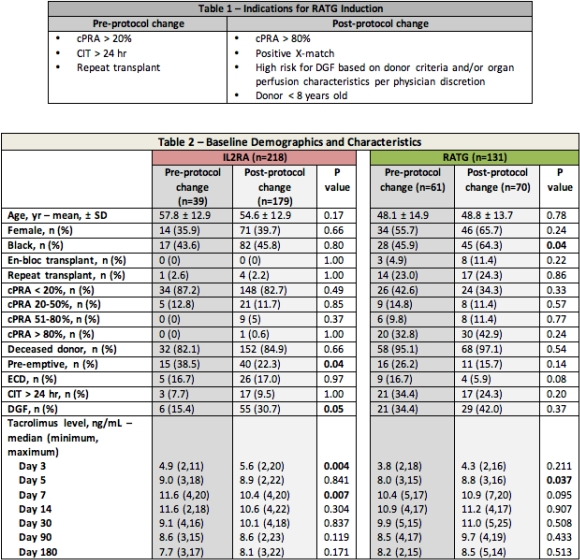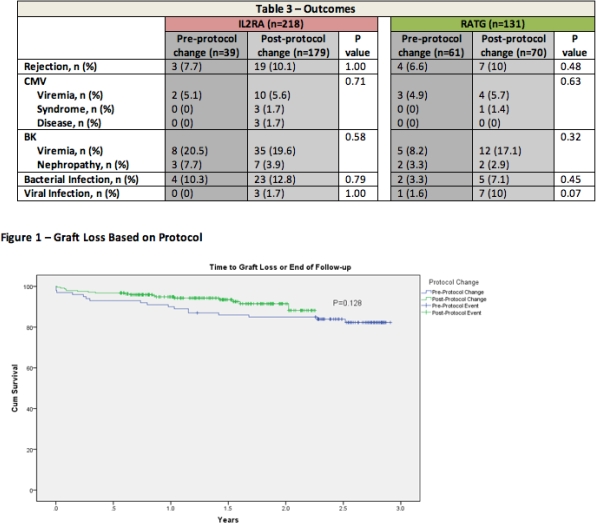Effectiveness of Protocol-Driven Induction Therapy in Adult Kidney Transplant Recipients
MUSC, Charleston, SC.
Meeting: 2015 American Transplant Congress
Abstract number: 289
Keywords: Immunosuppression, Induction therapy, Kidney transplantation
Session Information
Session Name: Concurrent Session: Kidney: Induction
Session Type: Concurrent Session
Date: Monday, May 4, 2015
Session Time: 4:00pm-5:30pm
 Presentation Time: 5:12pm-5:24pm
Presentation Time: 5:12pm-5:24pm
Location: Room 120-ABC
Background: Induction therapy significantly improves graft outcomes in kidney transplantation, but the optimal agent based on patient characteristics and immunologic risk is unknown. While many transplant centers are utilizing increased amounts of RATG, our preliminary data suggested this may be unnecessary, stimulating a change in our induction protocol. The aim of this study was to assess the effectiveness of a data-driven protocol change in induction therapy in a racially diverse, moderate to high immunologic risk patient population.
Methods: Single center retrospective cohort study of adult kidney transplant recipients comparing two induction protocols between 08/2011 and 12/2013. A protocol revision in 2012 adjusted the targeted population for RATG induction to very high immunologic risk recipients (Table 1). A tacrolimus-based triple immunosuppressant regimen served as maintenance therapy through the entire time period.
Results: 349 patients were included in this study. After the protocol revision, the use of RATG in black patients significantly increased. There were significantly fewer pre-emptive recipients and more patients with DGF in the IL2RA group (Table 2). There were minimal differences in tacrolimus levels between the protocol groups, with significantly higher levels at Day 3 in the IL2RA group and Day 5 in the RATG group post-protocol change. There were no significant differences in rejection or infection rates before and after the protocol change based on induction agent (Table 3). When comparing graft loss between the two overall protocols, there was no significant difference (Figure 1).
Conclusions: A protocol limiting the use of RATG induction to high immunologic risk recipients appears to have equivalent efficacy to a more traditional induction protocol. 

To cite this abstract in AMA style:
Casale J, Fleming J, Taber D, Staino C, Boyle K, Covert K, Pilch N, Meadows H, Mardis C, Chavin K, Bratton C, McGillicuddy J, Srinivas T, Baliga P. Effectiveness of Protocol-Driven Induction Therapy in Adult Kidney Transplant Recipients [abstract]. Am J Transplant. 2015; 15 (suppl 3). https://atcmeetingabstracts.com/abstract/effectiveness-of-protocol-driven-induction-therapy-in-adult-kidney-transplant-recipients/. Accessed March 5, 2026.« Back to 2015 American Transplant Congress
